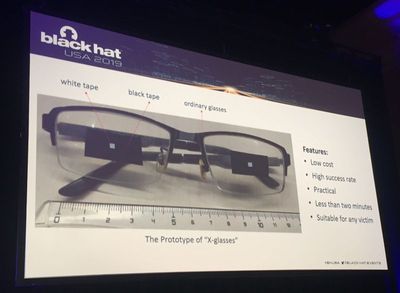During the Black Hat USA conference in Las Vegas, researchers demonstrated a Face ID bypass method that used glasses and tape to unlock and infiltrate the iPhone of an "unconscious" victim.
According to a report from Threatpost (via iMore), researchers from Tencent aimed to fool the "liveness" detection feature in biometrics, which is meant to distinguish "real" from "fake" features on people.

Liveness detection, said the researchers, detects background noise and response distortion or focus blur, allowing it to make sure that a face is a real face and not a mask. This liveness detection is used by Face ID, and Apple even has an "Attention Aware" feature that makes sure your iPhone doesn't unlock unless you're looking at it.
To trick Face ID, the researchers created prototype glasses with black tape on the lenses and white tape inside the black tape to emulate the look of an eye. When putting the glasses over a sleeping victim's face, they were able to access his iPhone and send themselves money through a mobile payment app.
This method worked because the researchers found that liveness detection works differently with glasses and essentially doesn't extract 3D information from the eye area when glasses are worn.
They discovered that the abstraction of the eye for liveness detection renders a black area (the eye) with a white point on it (the iris). And, they discovered that if a user is wearing glasses, the way that liveness detection scans the eyes changes.
"After our research we found weak points in FaceID... it allows users to unlock while wearing glasses... if you are wearing glasses, it won't extract 3D information from the eye area when it recognizes the glasses."
An attacker attempting to use this method in the real world would need a victim that's sleeping or unconscious, access to that victim's iPhone, and then glasses would need to be placed over the eyes without waking the person up. It's worth noting that this isn't a situation most people are likely to run into, and there's also no secondary research on this alleged method this time.
To mitigate the eye detection loophole in the future, researchers suggested biometrics manufacturers add identity authentication for native cameras and "increase the weight of video and audio synthesis detection."
Apple has designed Face ID with easy access disabling measures for situations where a person might be coerced or forced into unlocking an iPhone with facial recognition. Pressing on the sleep/wake button of a Face ID-enabled iPhone five times in rapid succession brings up an emergency SOS screen that automatically disables Face ID and requires a passcode to be entered before Face ID works again. Pressing and holding the side/top button and a volume button also works on the iPhone and the iPad Pro.
























